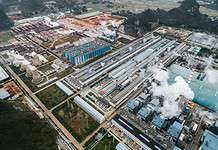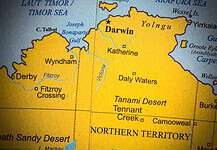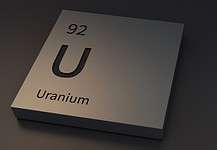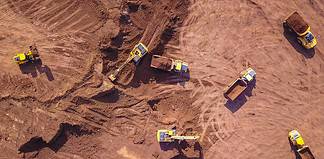Hundreds of industry workers descended on WA State Parliament on 10 October to protest the royalty increase. All images: The Chamber of Minerals and Energy WA.
BY ELIZABETH FABRI
THE WA Labor Government is licking its wounds after WA Liberals announced it will block its controversial gold royalty increase proposed to fix the State’s finances.
Announced back in September in the State Budget, the royalty involved a 50 per cent increase from the current rate of 2.5 per cent to 3.75 per from January next year, when the Australian gold spot price is above $1200.
The royalty increase received strong opposition from companies and industry groups such as the Chamber of Minerals and Energy WA (CMEWA), which launched a hard-hitting advertising campaign claiming the tax would hurt WA families and result in 3000 job losses.
On 29 September, the Labor Government lodged a notice with the Government Gazette to effect the change.
Gazetted items, however can be torn up by a disallowance motion in the Upper House by WA Liberals.
On 10 October, hundreds of mining bosses and industry workers assembled outside WA parliament to protest the royalty increase, ahead of the WA Liberal’s party room meeting on the matter.
WA Liberal leader Mike Nahan announced the Government’s proposed tax hikes would “destroy jobs” and the party had decided it will proceed with a disallowance motion.
“The WA Liberal Party made a decision to protect WA jobs,” Mr Nahan said. “We will block Labor’s 50 per cent increase in the gold royalty, standing up for jobs.”
WA Treasurer Ben Wyatt described WA Liberals decision as a “complete disregard” for the State’s finances, labelling the party as “financial wreckers”.
“Opposition leader Mike Nahan has today cast off any remaining shred of financial credibility,” Mr Wyatt said.
“Clearly not satisfied with the damage he caused while destroying the State’s finances as Treasurer, Mike Nahan has now added nearly $400 million back onto the State’s debt while Opposition leader.
“The idea that the Government should simply find an alternative revenue source, arguably one that impacts on no-one while also raising billions of dollars is quite simply laughable.”
In the days leading up to the decision, WA Mines minister Bill Johnston told The Australian Mining Review there was no Plan B if the Upper House proceeded with a disallowance motion, and the Government would have to go back through the Budget.
“It is a very difficult budgetary situation. We knew that the Budget had been completely ruined by the former Government; that was not a surprise to us,” Mr Johnston said.
“Unfortunately on top of that we have had $5 billion write downs off our revenue so we have to respond.
“We have to do what we can to get the State’s finances back under control.”
Mr Johnston said given the price of gold was nearing $200 higher than it was two years ago in Australian dollar terms, he did not think it was “unreasonable for the gold sector to pay more for the gold that belongs to the people of the State”.
“It’s important to remember the gold in the ground belongs to the Government not to the mining company.
“All we’re doing is asking the company’s to pay $20 extra per ounce.
“I don’t accept this idea that a $20 royalty is the different between a project proceeding and not proceeding.
“What I do accept is that the $20 makes the risks of the project higher, I accept that, but it simply can’t be true that a $20 change in the royalty makes the project unviable.”
CMEWA chief executive Reg Howard-Smith was one of many who welcomed the WA Liberals decision it would block the royalty.
“Our modelling clearly showed the direct and flow-on economic impacts of this proposal were too much to bear,” Mr Howard-Smith said.
“The reality is there are gold mines which are too marginal to absorb the 50 per cent increase in costs and jobs would have been lost.”

INDUSTRY VOICES
“All of our projects are high margin projects so the addition of the royalty is not going to change the business and how the business is run; that’s a reality. But this is an impost on the gold mining industry. It’s a breach of promises that the Labor party made during the campaign period.”
Independence Group Chief executive and managing director Peter Bradford.
“The WA gold industry is quite segmented and the scale of operators is really broad, from junior explorers to global major producers. [Increased costs] always goes through to discovery costs and exploration; the discovery of new deposits is becoming increasingly more challenging and any increase in the royalty will materially impact people’s decision to invest.”
Northern Star Chief executive Stuart Tonkin.
“It makes no economic sense that the WA Government would want to damage one of the engine rooms of our economy by hitting it with a 50 per cent increase in a major cost, when that only represents 0.2 per cent of the 2017/18 Revenue Budget. How is that Budget repair when 60 per cent of the revenue raised will go to Canberra and be re-distributed through the GST process? The opposition parties have all stood up for Western Australia as one of the world’s leading mining jurisdictions, and to stop job losses and prevent lost opportunities.”
AMEC Acting chief executive Graham Short.
“For our business that [would have been] a $6 million hole into our free cash flow. To think [the gold royalty] is not going to have an impact on WA jobs is unrealistic, and I suppose the biggest disappointment out of all this is that this is the third time this has been floated up. The previous two times it has been in consultation, and we’ve been able to engage with Government. This one has had no engagement whatsoever.”
Saracen Managing director Raleigh Finlayson








































